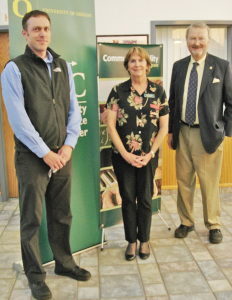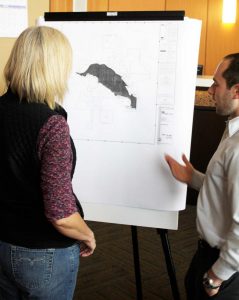Our Partners
 OPDR is a coalition of public, private, and professional organizations working collectively toward the mission of creating a disaster resilient and sustainable state. Developed and coordinated by the Institute for Policy Research and Engagement (formerly the Community Service Center), OPDR employs a service learning model to increase community capacity and enhance disaster safety and resilience statewide.
OPDR is a coalition of public, private, and professional organizations working collectively toward the mission of creating a disaster resilient and sustainable state. Developed and coordinated by the Institute for Policy Research and Engagement (formerly the Community Service Center), OPDR employs a service learning model to increase community capacity and enhance disaster safety and resilience statewide.
Who We Partner With
- Federal and Tribal Government
- State Government Agencies
- Local Government; County and City
- Nonprofit and Community-Based Agencies
What We Do
Community Plan and Project Development
We support communities in developing natural hazard risk reduction plans and projects by providing training programs, workshops, and hands-on assistance to communities. Additionally, we aim to build local capacity for disaster safety and risk reduction while developing a support network among communities and partners.
Applied Research and Technical Resource
We research, develop, and distribute resource materials and media that assist communities in planning and preparing for natural hazards. Examples of our research includes Technical Resource Guide, Natural Hazard Risk Reduction Plan Framework, etc.)
Training Programs and Capacity Building
We continually develop new training programs and modules through the Institute for Policy Research and Engagement at the University of Oregon. Examples of our work include Open for Business, Benefit/Cost Analysis, and Oregon Pre-Disaster Mitigation community training series.
Development of Strategic Alliances
We promote and facilitate collaborative strategic alliances between federal, state, and local agencies, not-for profits, academic institutions, and professional organizations to accomplish the goals and activities highlighted in our strategic plan.
Our Student Partners
The foundation of a learning experience is through interaction with other people. Our graduate students will have substantial interaction with their OPDR project team, the project manager, Institute for Policy Research and Engagement faculty and staff members, clients, local officials, boards or committees engaged in the project, other planning professionals, and residents of the community where the project is based. Students gain ‘real world’ experience within a supportive, academic environment.
In addition, the Institute for Policy Research and Engagement conducts applied research in conjunction with its mission to assist Oregon communities. Through project-based employment during the academic year and summer internships, students will have additional opportunites to participate on a range of projects with OPDR and other Institute for Policy Research and Engagement programs. Institute for Policy Research and Engagement Programs include:
Community Planning Workshop (CPW) >>>
CPW is an experiential program within the School of Planning, Public Policy and Management at the University of Oregon. Students work in teams under the direction of faculty and Graduate Employees to develop proposals, conduct research, analyze and evaluate alternatives, and make recommendations for possible solutions to planning problems in Oregon communities. The CPW model is unique in many respects, but is transferable to any institution that desires to link pedagogy with community service.
Resource Assistance for Rural Environments (RARE) >>>
The mission of the RARE AmeriCorps Program is to increase the capacity of rural communities to improve their economic, social, and environmental conditions. RARE participants assist communities and agencies in the development and implementation of plans for achieving a sustainable natural resource base and improving rural economic conditions while gaining community building and leadership skills.
Economic Development Administration University Center (EDAUC) >>>
EDAUC’s mission is to link university resources with communities for the purpose of enhancing regional sustainable economic development. EDAUC provides technical assistance to distressed communities throughout the state with the focus of creating sustainable local economies through capacity building, applied research, and partnerships.

